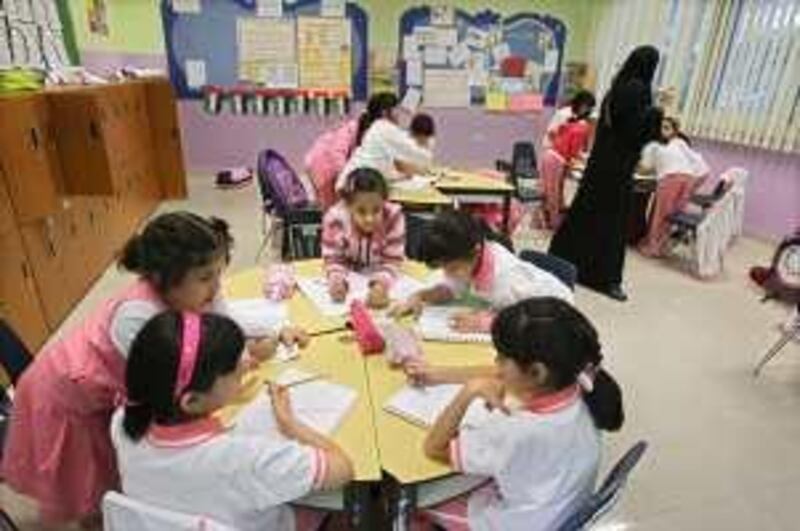ABU DHABI// All schools in Abu Dhabi will have to be accredited by a US body within eight years, the emirate's education regulator said yesterday. In announcing its agreement with AdvancED, an American outfit founded in 2006 that works with schools worldwide, Dr Mugheer Khamis al Khaili, the head of the Abu Dhabi Education Council (Adec), said the council was "confident that the [memorandum of understanding] would have a positive impact on the quality of schools in Abu Dhabi".
The council added in its statement that as soon as a school was accredited by AdvancED it would not be inspected as frequently - or as vigorously - by the council. School accreditations typically look at things such as quality of teaching and student performance. "It's a positive move," said Clive Pierrepont, the director of communications and marketing at Taaleem, the UAE's second-largest private school operator, whose schools are already in the process of acquiring the accrediation, which usually takes about five years.
"I think that most schools that have a good development plan look for external accreditation," he said. "It's a far more lengthy and in-depth process than the actual inspection systems that are in place. So we welcome and seek external accreditation and look forward to a wider recognition of accreditation as a benchmark or a kitemark for quality within schools." Dr George Robinson, the superintendent of the American Community School (ACS), said: "Having an accreditation model with standards in terms of governance of schools is without question best practice.
"From an American educator's point of view an accreditation model is the best way to establish the standards that schools are supposed to strive for and to build in mechanisms to reach those standards." Dr Robinson added that accreditation was useful because schools are given detailed feedback meant to help them reach certain standards. "It's good because it isn't just judgmental," he said. "If you aren't meeting the standards here are specific recommendations about the kinds of things you need to look at and take care of."
But, Dr Robinson said, it would be a long road for some schools in Abu Dhabi since the AdvancED standard will mirror that of other American accreditation outfits such as the Middle States Association, the accreditation body that ACS works with. "It's going to be a very long process in terms of trying to get some of the schools to be able to get to the point where they're able to meet the standards."
The Ministry of Education, in partnership with the British firm the Centre for British Teachers Education Trust, launched its own accreditation scheme last year for the Northern Emirates. In January, 63 of 71 schools were given the ministry's stamp of approval. It is unclear how the Abu Dhabi model will differ from what is now in place in the Northern Emirates. Adec recently started inspections for its private schools in a related attempt to standardise school quality.
Inspections started this autumn, a year after Dubai launched its first inspections, which assigned schools a ranking to help parents make more informed choices. Under the current Abu Dhabi inspection model, schools will be ranked but results will not be made public until inspections are in their second cycle. Under the new system, schools that do not meet Adec's minimum inspection standard of "satisfactory" will lose their licence to operate. Only schools judged to be "good" or better in inspections will be eligible for accreditation.
There are currently 71 schools housed in villas that are slated to be shut down during the 2011-2012 school year, some due to serious health and safety issues. klewis@thenational.ae






